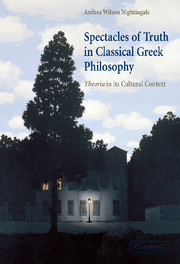Book contents
- Frontmatter
- Contents
- Acknowledgments
- Introduction
- 1 Theoria as a cultural practice
- 2 Inventing philosophic theoria
- 3 The fable of philosophy in Plato's Republic
- 4 Theorizing the beautiful body: from Plato to Philip of Opus
- 5 “Useless” knowledge: Aristotle's rethinking of theoria
- Epilogue: “Broken knowledge”? Theoria and wonder
- List of references
- Index of passages cited
- General index
5 - “Useless” knowledge: Aristotle's rethinking of theoria
Published online by Cambridge University Press: 22 September 2009
- Frontmatter
- Contents
- Acknowledgments
- Introduction
- 1 Theoria as a cultural practice
- 2 Inventing philosophic theoria
- 3 The fable of philosophy in Plato's Republic
- 4 Theorizing the beautiful body: from Plato to Philip of Opus
- 5 “Useless” knowledge: Aristotle's rethinking of theoria
- Epilogue: “Broken knowledge”? Theoria and wonder
- List of references
- Index of passages cited
- General index
Summary
It is entirely correct and completely in order to say, “You can't do anything with philosophy.” The only mistake is to believe that with this, the judgment concerning philosophy is at an end. For a little epilogue arises in the form of a counter-question: even if we can't do anything with it, may not philosophy in the end do something with us?
Heidegger, Introduction to MetaphysicsIf one looks at the history of knowledge, it is plain that at the beginning men tried to know because they had to do so in order to live … The desire for intellectual or cognitive understanding had no meaning except as a means for obtaining greater security as to the issues of action. Moreover, even when after the coming of leisure some men were enabled to adopt knowing as their special calling or profession, merely theoretical certainty continues to have no meaning.
Dewey, The Quest for CertaintyAristotle's conception of theoria represents a distinct departure from his predecessors. Aristotle explicitly refers to traditional theoria in discussing philosophic contemplation, but he uses only some of its standard features. In particular, he retains the idea that theoria involves detachment from practical affairs and “seeing” something divine and true. But he dispenses with the notion of a round-trip journey abroad. As we will see, he compares the philosopher to a theoros who goes to a festival simply for the sake of seeing the spectacle.
- Type
- Chapter
- Information
- Spectacles of Truth in Classical Greek PhilosophyTheoria in its Cultural Context, pp. 187 - 252Publisher: Cambridge University PressPrint publication year: 2004

